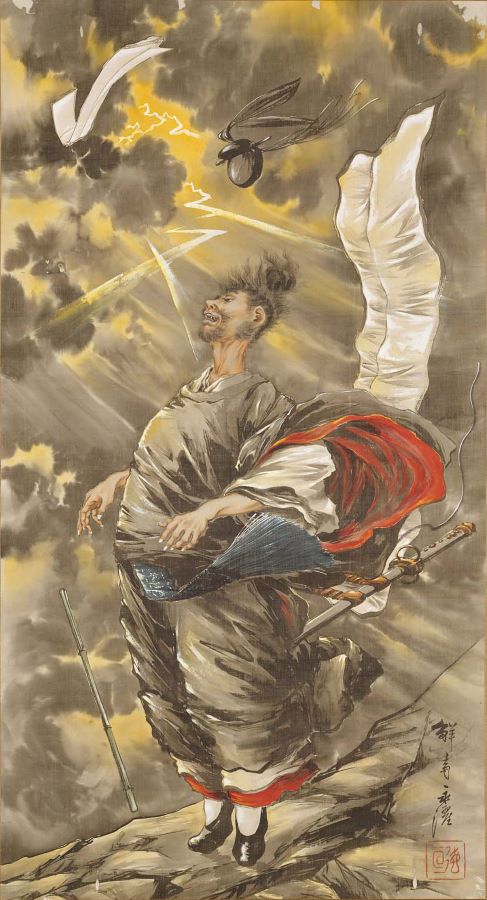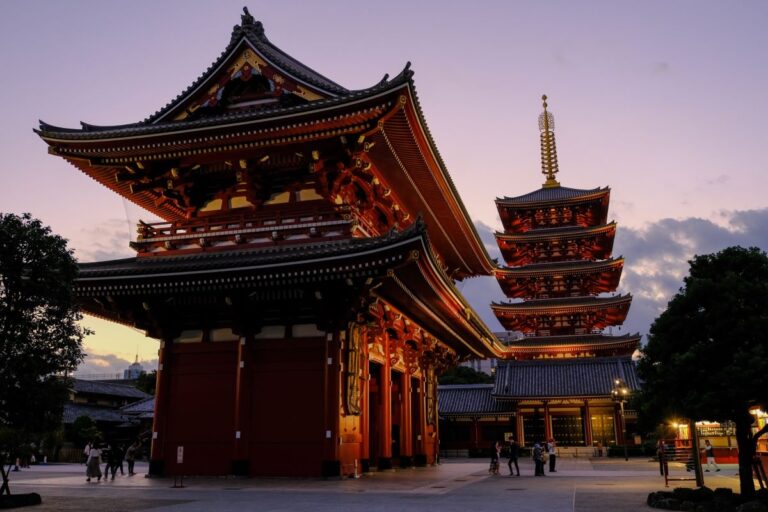Sugawara No Michizane, a highly revered figure in Japanese history, led a remarkable life filled with triumph and tragedy. Born into a prestigious family, Michizane’s exceptional intellect and dedication to learning propelled him to prominence in the Imperial Court.
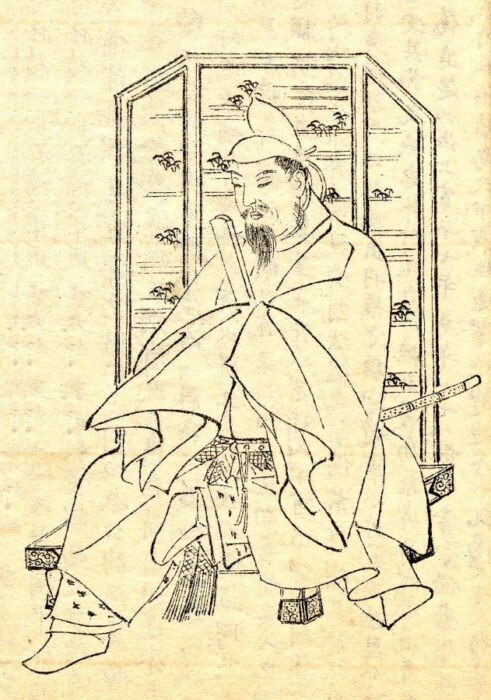
However, his fortunes took a dark turn when he was unjustly exiled, leading to a series of events that ultimately sealed his tragic fate. Despite the hardships he faced, Michizane’s legacy and cultural influence endure to this day, celebrated through modern day memorials and festivities.
Key Takeaways
- Sugawara No Michizane was a highly talented and educated individual, displaying exceptional talent from a young age and receiving a comprehensive education in various subjects.
- He navigated the complex political landscape of his time and became a sought-after advisor to influential figures, thanks to his deep understanding of literature and history.
- His rise to prominence in the Imperial Court saw him gain recognition as a trusted advisor to the emperor, earning him the title of ‘Master of the Arts’ and establishing him as a symbol of enlightenment and progress.
- Exiled unjustly, Michizane endured a life of hardship and loneliness, stripped of titles and separated from his family. However, his legacy and cultural influence live on, inspiring poets, writers, and artists and reminding people of the power of perseverance and the fight for justice.
Early Life and Education
Sugawara no Michizane’s early life and education were crucial in shaping his future achievements. Born in the year 845 in Japan, Michizane showed exceptional talent from a young age. His father recognized his son’s potential and ensured he received a comprehensive education. Michizane studied various subjects, including poetry, calligraphy, and Confucianism. His passion for learning was evident, and he quickly became a prodigy in the scholarly world.
Growing up in a time of political unrest, Michizane’s education played a vital role in his ability to navigate the complex landscape. His extensive knowledge and eloquence made him a sought-after advisor to influential figures. Michizane’s deep understanding of literature and history also influenced his writing, as he penned numerous poems and essays that resonated with the people.
Michizane’s early life and education laid the foundation for his future accomplishments as a revered scholar and poet. His dedication to learning and his ability to express himself through words would continue to shape his legacy, making him a symbol of intellectual freedom and artistic expression.
Rise to Prominence in the Imperial Court
Despite facing numerous challenges, Sugawara no Michizane quickly gained recognition and rose to prominence in the imperial court. His wit, intelligence, and dedication to his studies impressed the court officials, and he soon became a trusted advisor to the emperor.
Michizane’s keen understanding of poetry and calligraphy further solidified his position, earning him the title of ‘Master of the Arts.’ He used his influence to champion the arts and education, advocating for the importance of literature and scholarship in society.
Michizane’s passion for learning and his commitment to intellectual freedom resonated with many in the court, who saw him as a symbol of enlightenment and progress. Despite his humble background, Michizane’s rise to prominence in the imperial court serves as a testament to his exceptional talent and unwavering dedication to his craft.
Exile and Tragic Fate
Unfortunately, Sugawara no Michizane, a highly respected scholar and poet, was forced into exile and faced a tragic fate due to political intrigue and jealousy within the imperial court.
Michizane’s rise to prominence had made him a target for those who felt threatened by his intelligence and influence. In 901, he was falsely accused of plotting against the emperor and was sent into exile in Kyushu. This exile marked the beginning of his downfall.
Separated from his family and stripped of his titles, Michizane endured a life of hardship and loneliness. He deeply missed the court and the scholarly pursuits that had defined his identity. Despite his longing for freedom and justice, Michizane’s tragic fate was sealed, leaving behind a legacy of brilliance and sorrow.
Legacy and Cultural Influence
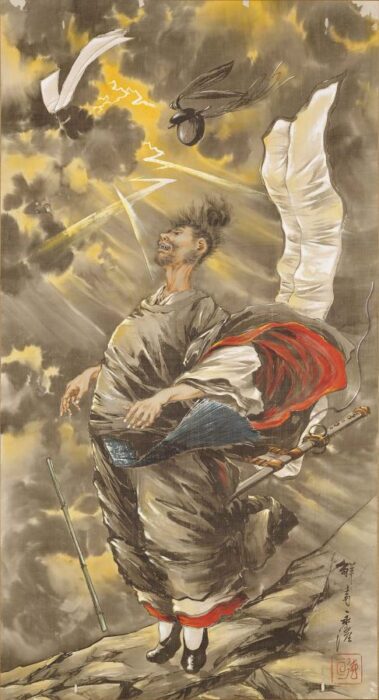
You can still see the lasting impact of Michizane’s legacy in Japan today. His tragic story has become the subject of numerous works of literature and art. His exile and subsequent death have inspired countless poets, writers, and artists to create pieces that capture the essence of his life and the injustice he faced.
From haikus to paintings, Michizane’s tale has been immortalized in various forms of expression. His story serves as a reminder of the power of perseverance and the importance of standing up for one’s beliefs, even in the face of adversity.
Michizane’s legacy continues to inspire people to question authority, fight for justice, and strive for a world where freedom and fairness prevail.
Modern Day Celebrations and Memorials
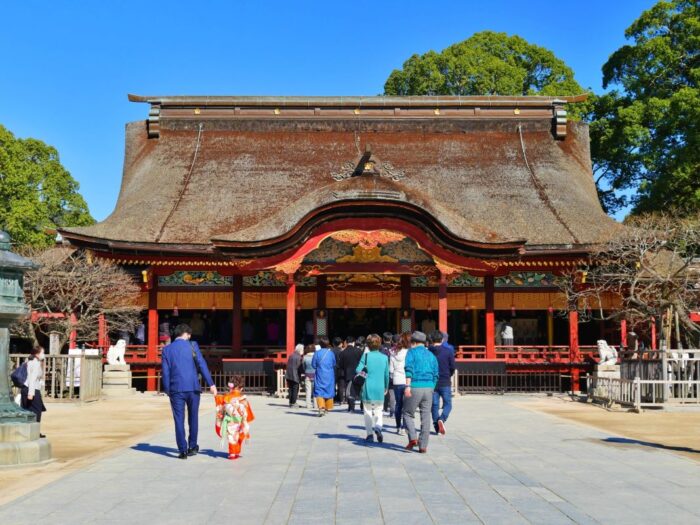
There are various modern day celebrations and memorials that honor the life and legacy of Michizane. One of the most prominent events is the Tenjin Matsuri festival held in Osaka, Japan. This festival celebrates Michizane’s connection to learning and scholarship, as he is revered as the patron deity of scholars.
During the festival, people gather to pay their respects and seek blessings from Michizane’s shrine. The atmosphere is electrifying, with lively parades, traditional music, and delicious street food.
Another way Michizane is remembered is through the plum blossoms, which are believed to be a symbol of his spirit. Many gardens, temples, and shrines across Japan hold special plum blossom viewing events, where visitors can admire the beautiful flowers and reflect on Michizane’s wisdom and intellect.
These celebrations and memorials serve as a reminder of Michizane’s enduring influence and his dedication to education and knowledge.
Frequently Asked Questions
How Did Sugawara No Michizane’s Childhood Experiences Shape His Later Career?
Childhood experiences can often shape one’s later career. In the case of Sugawara No Michizane, his early life played a significant role in his path to success, influencing his interests, skills, and ultimately leading him to a remarkable career.
What Were the Key Factors That Led to Sugawara No Michizane’s Rise to Prominence in the Imperial Court?
Sugawara No Michizane’s rise to prominence in the imperial court was influenced by his exceptional intelligence, dedication to learning, and his ability to establish meaningful connections with influential individuals in the court.
How Did Sugawara No Michizane’s Exile Impact His Personal Life and Relationships?
Sugawara No Michizane’s exile had a profound impact on his personal life and relationships. Stripped of his status and forced to live in a distant province, he experienced isolation and heartbreak, losing the support and connection he once had at the imperial court.
What Are Some of the Most Notable Cultural Contributions or Influences That Sugawara No Michizane Left Behind?
Sugawara No Michizane left behind notable cultural contributions and influences. These include his poetry, calligraphy, and the establishment of Tenjin shrines. His legacy continues to inspire and shape Japanese literature and education.
Are There Any Specific Modern Day Celebrations or Memorials Dedicated to Sugawara No Michizane That Are Held Annually?
There are annual celebrations and memorials dedicated to Sugawara No Michizane in modern times. These events honor his contributions and influence, ensuring that his legacy continues to be remembered and celebrated.
The Sum Up
To sum it up, Sugawara no Michizane was a highly influential figure in Japanese history. His tragic fate continues to resonate with people today. From his early brilliance as a scholar to his rise in the imperial court, Michizane’s intelligence and dedication were unmatched.
However, his exile and subsequent death served as a reminder of the unpredictable nature of power and politics. Despite his tragic end, Michizane’s legacy lives on through the cultural influence he left behind.
From annual celebrations to memorials, his impact on Japanese society is still felt. This makes him a figure worth remembering and honoring.

